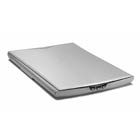
Scanners used to be the exclusive domain of high-end graphics and publishing enterprises, but today they are a common feature of both the desktop and laptop computing landscape. Whether your primary computer is a laptop or a desktop, if you work from an office or while on the go, there is a scanner out there that will fit your unique requirements.
Contents
Flatbed Scanners: These are the most common type of scanners. Due to their size, flatbed scanners are most appropriate for use with a desktop computer. Flatbed scanners typically rate higher than other models when compared for image quality and scanning speed, so they are preferred for professional applications.
Sheet-fed Scanners: This category of scanners offers advantages in size and portability, making them the perfect companion for laptops and for mobile use. While they are slower and offer slightly compromised image quality compared to the larger flatbed scanners, the scan quality and speed is still more than adequate for most uses. For thrifty shoppers, sheet-fed scanners are generally less expensive than flatbeds.
Pen Scanners: The ultimate in portability is provided by pen scanners, an increasingly popular choice for students and professionals on the go. This convenience comes with a compromise in speed and quality, and they require extra diligence on the part of the user in order to capture a clear scan.
Scanner Size – Most people are scanning letter-sized documents and pictures, and the standard 8.5” feed is sufficient. However, if you plan on scanning legal-sized documents or larger graphics print-ups, you will want a scanner that features a larger scanner size.
Scan Speed – Scanner speeds are broadly similar across all models, but if you are using your scanner for bulk applications, you will want to select a model that is optimized for speed.
Connectivity – Parallel port and SCSI connections have given way almost completely to the convenience of USB hookups. Almost all newer models also support wireless connectivity, which is an added convenience if your primary computer is a laptop.
Software – The software that comes standard with the scanner is an important consideration, and one that is often overlooked. Basic models feature basic software that is good for storing and retrieving your images. As the scanner increases in sophistication and performance, so does the software. More robust software bundles can include automatic image editing and organizing features, upload streamlining that facilitates sharing your images, and repair/modification software that allows you to quickly and easily touch up photos and convert text documents.
Many of the names of the most popular scanner manufacturers are very familiar, and have a long history of excellence in the printer market as well. Epson, Canon, and HP offer scanners of all categories and at a full range of performance levels and price points. Fujitsu is another brand that features a number of models that have been well-reviewed. Dane and NeatReceipts specialize in highly-portable pen scanners, and offer several different models.
 alaTest USA
alaTest USA alaTest UK
alaTest UK alaTest Deutschland
alaTest Deutschland alaTest France
alaTest France alaTest Italia
alaTest Italia alaTest España
alaTest España







 Drive sales with reviews on your site
Learn more about our B2B solutions
Drive sales with reviews on your site
Learn more about our B2B solutions